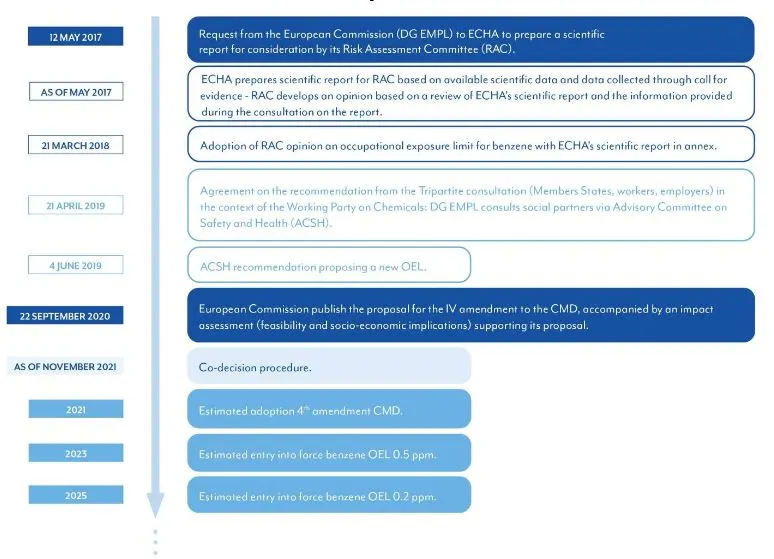The industry view on the IV amendment of the European Commission Carcinogens and Mutagens Directive
FuelsEurope and Petrochemicals Europe, representing the EU Refining industry and the Petrochemical sector, essential actors in the chemicals’ supply chain support the Proposal for the fourth amendment to the Carcinogens or Mutagens at Work Directive (CMD, 2004/37/EC) as adopted by the European Commission on 22nd September 20201. This amendment introduces the revised Occupation Exposure Level (OEL) for benzene aiming at protecting citizens – particularly the workers – exposed to carcinogens. Welcoming the European Commission efforts to beat cancer, underlined also by the European Commission political guidelines, we acknowledge the continuous and long-lasting EU efforts to reduce cancer incidence and the objective of adapting the Occupational Health legislation according to the latest scientific findings.
We support the revised OEL value of 0.2 ppm for benzene as it is in line with the research that scrutinised nearly 100 publications and studies on benzene toxicology. The studies concluded that a safe level of exposure where no health effect is detected could be set at 0.25ppm; we however accept an additional safety factor for 0.2 ppm3. For the refining and petrochemical industry sector, lowering the OEL from the current level of 1ppm to the revised value of 0.2 ppm for benzene will have a substantial positive impact on the EU worker protection.
At the same time, it will require important investments to adapt installations to the highest standards. To realise this, the involved sectors are preparing industry guidelines with recommendations to achieve the substantially improved OEL for benzene. We welcome the attention to the feasibility of the new OEL through the inclusion of a transitional period of 4 years after entry into force of this Directive 4.
Considering the key importance of the health effect in order to protect the workers, we welcome that the Commission retained the tri-partite Advisory Committee on Safety and Health at Work (ACSH) priorities for new or revised scientific evaluations of OELs based on scientific evidence and a thorough assessment of the technical feasibility and socio-economic impact. Long-standing collaboration in the preparation of the revision of the OELs has been fundamental to achieve an acceptable OEL for both workers and employers.
We strongly believe that this approach must perpetuated with the involvement of Occupational Safety and Health experts, timely consultation of industry and other stakeholders, and through the existing procedures involving the ACSH including the WPC. To conclude, we are of the opinion that a predictable and stable regulatory framework is needed to unlock investments necessary to amongst others implement the revised OEL for benzene, to secure strategic autonomy in the EU for essential chemicals, to reinforce continued innovation, and to protect EU workers.



